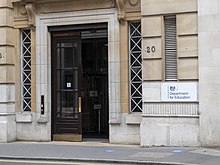The Department for Education (DfE) is a ministerial department of the Government of the United Kingdom. It is responsible for child protection, child services, education (compulsory, further, and higher education), apprenticeships, and wider skills in England.[5]
 | |
 20 Great Smith Street, Westminster | |
| Department overview | |
|---|---|
| Formed | 2010 |
| Preceding agencies |
|
| Jurisdiction | Government of the United Kingdom |
| Headquarters | Sanctuary Buildings, Great Smith Street, London, England, United Kingdom |
| Employees | 3,885 (2012)[1] |
| Annual budget | £58.2 billion (2015–16)[2] |
| Secretary of state responsible | |
| Department executive |
|
| Child agencies | |
| Website | www |
A Department for Education previously existed between 1992, when the Department of Education and Science was renamed, and 1995, when it was merged with the Department for Employment to become the Department for Education and Employment.
The current holder of Secretary of State for Education is the Rt. Hon. Bridget Phillipson MP and Susan Acland-Hood is the permanent secretary.
The expenditure, administration, and policy of the Department of Education are scrutinised by the Education Select Committee.
History
The DfE was formed on 12 May 2010 by the incoming Coalition Government, taking on the responsibilities and resources of the Department for Children, Schools and Families (DCSF).
In June 2012 the Department for Education committed a breach of the UK's Data Protection Act due to a security flaw on its website which made email addresses, passwords and comments of people responding to consultation documents available for download.[6]
In July 2016, the department took over responsibilities for higher and further education and for apprenticeship from the dissolved Department for Business, Innovation and Skills.[7]
Predecessor bodies
- Committee of the Privy Council on Education, 1839–1899
- Education Department, 1856–1899
- Board of Education, 1899–1944
- Ministry of Education, 1944–1964
- Department of Education and Science, 1964–1992
- Department for Education, 1992–1995
- Department for Education and Employment (DfEE), 1995–2001
- Department for Education and Skills (DfES), 2001–2007
- Department for Children, Schools and Families (DCSF), 2007–2010
Responsibilities
The department is led by the secretary of state for education. The permanent secretary from December 2020 is Susan Acland-Hood.[4] DfE is responsible for education, children's services, higher and further education policy, apprenticeships, and wider skills in England, and equalities. The predecessor department employed the equivalent of 2,695 staff as of April 2008 and as at June 2016, DfE had reduced its workforce to the equivalent of 2,301 staff.[8] In 2015–16, the DfE has a budget of £58.2bn, which includes £53.6bn resource spending and £4.6bn of capital investments.
Ministers
The Department for Education's ministers are as follows, with cabinet members in bold:[9]
| Minister | Portrait | Office | Portfolio |
|---|---|---|---|
| Bridget Philipson MP |  |
Secretary of State for Education | Overall responsibility for the department; early years; children's social care; teacher recruitment and retention; the school curriculum; school improvement; academies and free schools; further education; apprenticeships and skills; higher education. |
| Minister for Women and Equalities | Promoting equality of opportunity for everyone, and reducing negative disparities; strategic oversight of Government’s equality policy, for women, ethnicity and LGBT; sponsorship of the Social Mobility Commission and Equality and Human Rights Commission; overview of the overarching equalities legislative framework, including the Equality Act | ||
| Anneliese Dodds MP |  |
Minister of State for Women and Equalities | |
| Baroness Smith of Malvern |  |
Minister of State for Skills | Skills England; technical qualifications, including T Levels; higher technical education (levels 4 and 5); adult education, including basic skills and combined authority devolution; careers advice and support for young people not in employment, education or training (NEETs) (including the Careers and Enterprise Company); apprenticeships, including the growth and skills levy; Technical Excellence Colleges; local skills improvement plans; governance, intervention and accountability of further education colleges; funding for education and training, provision and outcomes for 16- to 19-year-olds; further education funding, financial stability and workforce; access to higher education, participation and lifelong learning; quality of higher education and the student experience (including the Office for Students); student finance (including the Student Loans Company); international education |
| Catherine McKinnell MP |  |
Minister of State for School Standards | School improvement, intervention and inspection (including links with Ofsted); regional school improvement teams; initial teacher training and incentives; teacher retention including the early career framework and teacher training entitlement; school leadership; teacher pay and pensions; school support staff; core school funding; qualifications (including links with Ofqual); curriculum and assessment, including the curriculum and assessment review and creative education; special educational needs and disabilities (SEND) and high needs; alternative provision; school governance; admissions; faith schools; school uniform; school transport; access to sport, arts and music in education, working with other departments; pupil premium |
| Janet Daby MP |  |
Parliamentary Under-Secretary of State for Children and Families | Children’s social care; children’s unique identifier; children in care and children in need; looked-after children; child protection; adoption; kinship care and foster care; care leavers; children’s social care workforce; unaccompanied asylum-seeking children; local authority improvement; family hubs; families support and parenting |
| Stephen Morgan MP |  |
Parliamentary Under-Secretary of State for Early Education | Early years education including for children with special educational needs and disabilities (SEND); childcare and the home learning environment; early years workforce; early communication skills and early intervention; breakfast clubs; school food, including free school meals; independent schools; maintenance and improvement of the education estate; environmental sustainability in the education sectors; school attendance, including register of children who are not in school; mental health support in schools; safeguarding, online safety and prevention of serious violence in schools and post-16 settings; counter extremism in schools and post-16 settings; behaviour, preventing bullying and exclusions in schools; use of data, digital technology and artificial intelligence (AI) in education; use of research, science and evidence within the Department for Education |
Board
The management board is made up of:
- Permanent secretary – Susan Acland-Hood
- Director-General, Families – Justin Russell
- Director-General, Regions – John Edwards
- Director-General, Skills – Julia Kinniburgh
- Director-General, Schools – Juliet Chua
- Director-General, Strategy – Tony Foot
- Chief operating officer – Jane Cunliffe
- Chief executive, Education & Skills Funding Agency – David Withey
Non-executive board members:[5]
- Marion Plant; CEO of the Midland Academies Trust and principal
- Ruby McGregor-Smith, Baroness McGregor-Smith; former chief executive of Mitie Group
- Ian Ferguson; businessman
Locations
As at 2 August 2016, the DfE has five main sites:[10]
Agencies and public bodies
Agencies
Education and Skills Funding Agency
The Education and Skills Funding Agency (ESFA)[11] was formed on 1 April 2017 following the merger of the Education Funding Agency and the Skills Funding Agency. Previously the Education Funding Agency (EFA) was responsible for distributing funding for state education in England for 3- to 19-year-olds, as well as managing the estates of schools, and colleges and the Skills Funding Agency was responsible for funding skills training for further education in England and running the National Apprenticeship Service and the National Careers Service. The EFA was formed on 1 April 2012 by bringing together the functions of two non-departmental public bodies, the Young People's Learning Agency and Partnerships for Schools.[12] The SFA was formed on 1 April 2010, following the closure of the Learning and Skills Council.[13] David Withey is the agency's chief executive.[14]
Skills England
Skills England is a planned agency that would will replace the Institute for Apprenticeships and Technical Education over a 9 month period commencing in July 2024 subject to legislation.[15]
Standards and Testing Agency
The Standards and Testing Agency (STA) is responsible for developing and delivering all statutory assessments for school pupils in England.[16] It was formed on 1 October 2011 and took over the functions of the Qualifications and Curriculum Development Agency. The STA is regulated by the examinations regulator, Ofqual.[17]
Teaching Regulation Agency
The Teaching Regulation Agency (TRA) is responsible for regulation of the teaching profession, including misconduct hearings.[18] Its predecessors include the National College for Teaching and Leadership (to 2018), the Teaching Agency (to 2013) and the Training and Development Agency for Schools (from 1994).
Public bodies
The DfE is also supported by 10 public bodies:
| Non-ministerial departments | Ofqual; Ofsted |
| Executive non-departmental public bodies | Office for Students; Office of the Children's Commissioner; Student Loans Company |
| Advisory non-departmental public bodies | School Teachers' Review Body |
| Other | Office of the Schools Adjudicator |
Devolution
Education, youth and children's policy is devolved elsewhere in the United Kingdom. The department's main devolved counterparts are as follows:
National Curriculum 2014
The Department for Education released a new National Curriculum for schools in England for September 2014, which included 'Computing'.[21] Following Michael Gove's speech in 2012,[22] the subject of Information Communication Technology (ICT) has been disapplied and replaced by Computing. With the new curriculum, materials have been written by commercial companies, to support non-specialist teachers, for example, '100 Computing Lessons' by Scholastic. The Computing at Schools organisation[23] has created a 'Network of Teaching Excellence'to support schools with the new curriculum.[24]
Post-16 area reviews
In 2015, the department announced a major restructuring of the further education sector, through 37 area reviews of post-16 provision.[25] The proposals were criticised by NUS Vice President for Further Education Shakira Martin for not sufficiently taking into account the impact on learners;[26][27] the Sixth Form Colleges' Association similarly criticised the reviews for not directly including providers of post-16 education other than colleges, such as school and academy sixth forms and independent training providers.[28]
Funding and grants
In 2018, The Department for Education confirmed their commitment to forming positive relationships with the voluntary and community sector.[29]
In 2020 the department began funding the National Tutoring Programme which employed private companies to deliver the tuition including at least one which uses children as tutors, paying them £1.57 per hour.[30] Tutors received up to £25 of the between £72 and £84 per hour the government paid the companies.[31]
See also
References
Further reading
External links
Wikiwand in your browser!
Seamless Wikipedia browsing. On steroids.
Every time you click a link to Wikipedia, Wiktionary or Wikiquote in your browser's search results, it will show the modern Wikiwand interface.
Wikiwand extension is a five stars, simple, with minimum permission required to keep your browsing private, safe and transparent.

